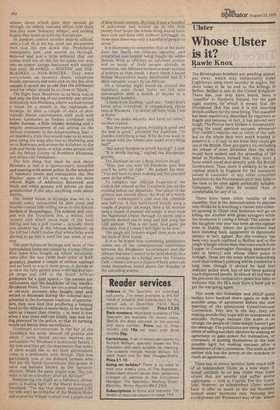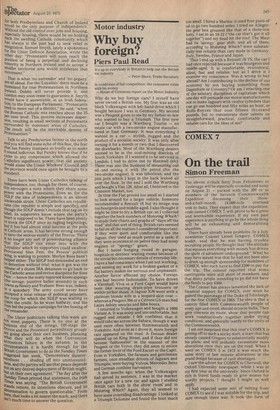Ulster
Whose Ulster is it?
Rawle Knox
The Birmingham bombers are, pending appeal, put away, which may temporarily make Englishmen sleep more soundly at nights, but there looks to be no end to the killings in Belfast. Belfast is also in the United Kingdom. There has, you may have heard, been a `ceasefire' in Northern Ireland. for the past eight months, by* which is meant that the Provisional IRA has said it is not shooting British soldiers for the time being. The ceasefire has been repetitively described by reporters as fragile and tenuous; in fact, it has proved very tough. The Provos have broken it occasionally, giving the usual specious excuses, whenever they couldn't restrain one or other, of the lads, but on the whole they very much wanted to preserve it — if only to see what they could get out of the British. They got quite a lot, including the release of more detainees than the army would have wished and the spreading of the belief in Northern Ireland that they were a force which could deal directly with the British Government. Thus, there is unlikely to be any reprisal attack in England for the sentences passed at Lancaster, or any other concerted brutalities by the Provisionals until they believe the time to be once again politically suitable. Unhappily, that may be sooner than is comfortable for any of us.
There have been other results of the ceasefire. One is the demonstration to anyone who thinks he is watching a classic anti-colonial uprising in Ulster that Irishmen will go on killing one another with great savagery while the revolution is taking a break. The extent of the slaughter this year has been an eye-opener even in Dublin, where the government had been standing back, apparently in diplomatic silence; in fact, aghast. But the violence has been very much confined to Belfast and to the jungle triangle whose base-line runs south from Lurgan to Crossmaglen (bending eastward to take in Newry) and whose other point is Armagh. These are the areas where something more than ordinary policing will be needed for a long time, though it should be said that ordinary police work has of late been getting much improved results. In almost all the rest of the province the comparative peace has been so welcome that the IRA may have a hard job to get the war going again.
This week the Unionists and SDLP party leaders have buckled down again to talk on possible areas of agreement before the new meeting of the postponed Constitutional Convention. Very late in the day, they are making sounds they hope will be interpreted as amicable. Perhaps because the noise is so strange, the people of Ulster simply haven't got the message. The politicians are being accused either of selling out their electors by seeking an agreement to gain power for themselves, or conversely of putting themselves in the best possible light for making excuses after a breakdown of the Convention. The truth is that neither side has the power or the mandate to reach an agreement.
There has, in recent months, been much talk of an independent Ulster as a new state.. It would certainly be no Jess Viable than some others that are smaller and suffer 'worse nightmares — look at Cyprus. For the 'Loyalists', however, an independent Ulster would have to offer as much as the old Northern Ireland under Stormont rule. Nothing less could protect the 'Protestant way of life', which for both Presbyterians and Church of Ireland would be the only purpose of independence. Without the old control over jobs and housing, especially housing, there would be no holding back the swelling Catholic community which has always in the past had to seek relief in emigration. Samuel Smyth, lately a spokesman for the Ulster Defence Association, wrote the Other day: "Protestants will soon reach the Position of being a perpetual and declining minority in Northern Ireland and to accept a smaller territorial area would accelerate that movement"
That is what 'no surrender' and 'no popery' are all about. For the 'Loyalists' there must be a homeland for true Protestantism in Northern Ireland. Dublin will never provide it, and London may soon cease to guarantee it. Smyth Would have it answerable, in an Irish federation, to the European Parliament. "Protestants tend to move out of a district," he said, "when the Roman Catholic mix reaches about the 35 Per cent level. This process increases dispersion, resulting in small sections of Protestants surrounded by dominant areas of Catholics. The result will be the inevitable demise, of Protestantism."
Talk to any Presbyterian farmer in the north and you will find some echo of this fear, the fear that Ian Paisley trumpets so loudly as to make it sound ludicrous. But Paisley knows that if he came to any compromise which allowed the Catholics significant power, that old anxiety would rouse the Ulster Workers' Council and the province would once again be brought to a standstill.
There have been Ulster Catholics talking of independence, too, though for them, of course, this envisages a state where they share some Power with the Protestants. Even so, for the S. DLP the idea of independence is an almost Intolerable strain. Ulster Catholics are republicans (the republic is simple and specific), and though the SDLP doesn't include that tag on its label, its supporters know where the party's heart is supposed to be. There have been plenty to mock the SDLP since its ragbag beginnings, but it has had almost total success at the polls in Catholic areas. It has become strong enough to earn the serious enmity of the Provos. There is no longer any sort of powersharing alliance that the SDLP can enter into with the ,Loyalists' which its supporters could swallow. Provisional Sinn Fein, the Provos' political
ng, is waiting to pounce. Merlyn Rees hasn't "elPed either. The SDLP had demanded an end to detention without trial; what it got was the release of a dozen IRA detainees to go back to the Catholic areas and revive discipline for Sinn rein , — hence the many reported kneecappings tale savage, punitive bullet wounds) in such t,oWns as Newry and Trabane. Rees was, indeed, In a quandary. The army could never have accepted a total release of political prisoners, the coup for which the SDLP was waiting to claim the credit. So he went halfway, and Sin Petri led the popular campaign for the freeing of the remainder.
The Ulster politicians talking this week are ,not even puppets. There is no one at the huusiness end of the strings. Off-stage the 'rovos and the Protestant paramilitary groups .re going about their own business, planning What they will do when the Convention announces failure in the autumn. In the ejrcumstances it is hardly enough for the tintish Government to do as the Sunday Times Stiggested last week, "Demonstrate disinterestedness , . shading off into uninterestedness, and the parties will see that peace depends nOt on any desired deployment of British might, bc,i-lt on their own agreement." The day after the `„,.tinday Times printed that statement, the Irish untes was saying: "The British Government stands remote, its intentions obscure, and its g`hietermination to govern questionable." From
ere, that looks a lot nearer the mark; and there Isn't much time to answer the question.



































 Previous page
Previous page